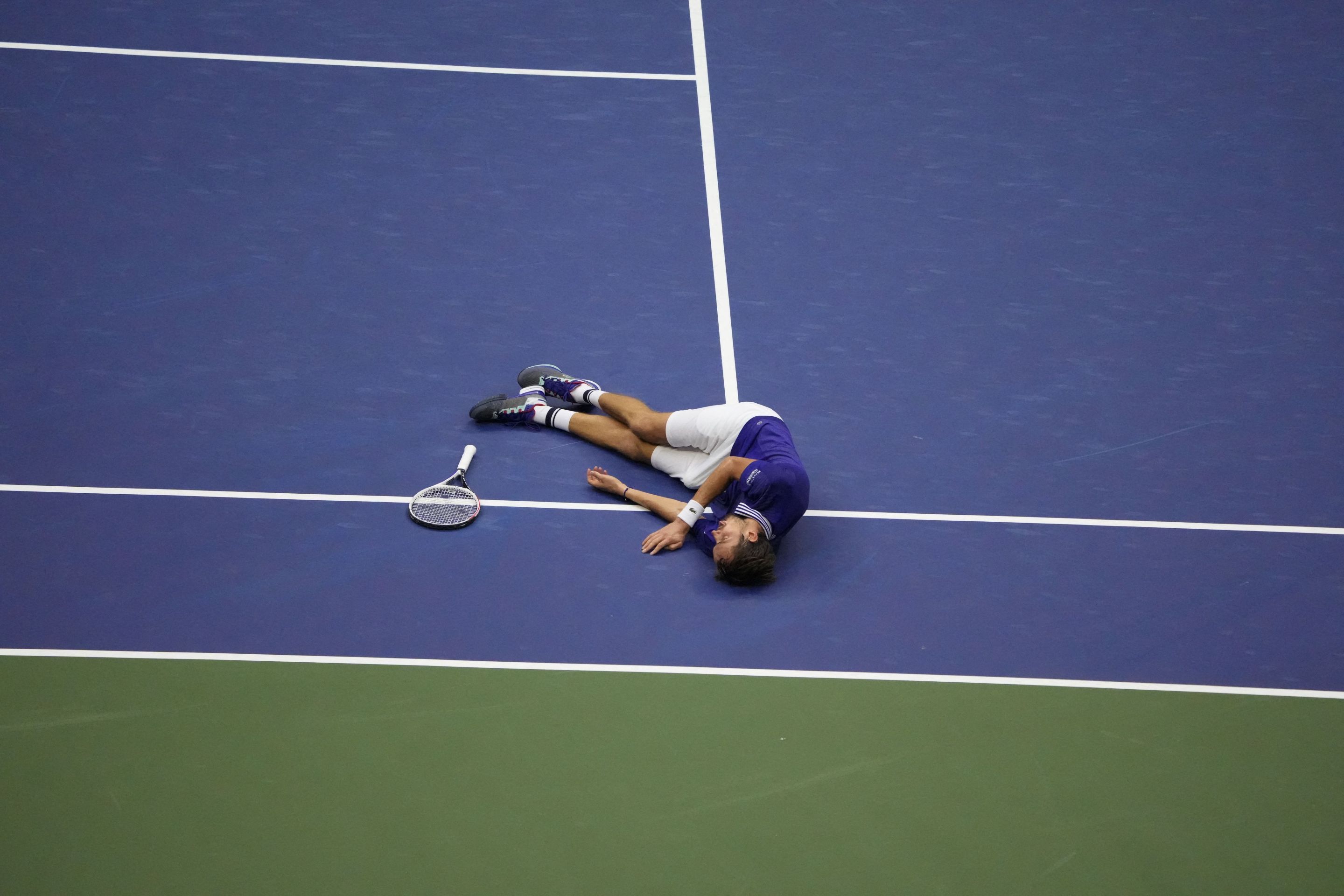Every phase of Sunday's U.S. Open men's final bent the plot further and further away from what a tennis observer has come to expect: Novak Djokovic looked sluggish as he ran side-to-side on the baseline, got wrecked in backhand-to-backhand exchanges, failed to figure out an opponent's serve, went into last-ditch serve-and-volley mode, cried into a towel mid-match, earned the New York crowd's support, and lost a major final to someone younger than him. Each of those developments, until the last, felt like an appetizer for an inevitable come-from-behind victory, as if the Serbian were deliberately constructing the grandest possible circumstances for the most historically resonant win of his career. Even his change of shirt in the third set could be read as a climactic turning point, for anyone intent on seeing one.
Because this was Djokovic—the avatar of stamina, who has made a habit of losing casual first sets at this Open, and who said in Paris that he relishes the feeling of going five sets against a young player—I wouldn't believe it was over until the tennis ball died on championship point. And then it did, as No. 2 seed Daniil Medvedev finally got a first serve into play and won his first major, 6-4, 6-4, 6-4. So concluded Djokovic's pursuit of the calendar Grand Slam, which was 96 percent complete heading into Sunday's match, and so he remains at 20 major titles, tied with Roger Federer and Rafael Nadal.
Dissatisfaction with the match won't be relegated to Djokovic and his legion of flag-thumping supporters. Plenty of neutral tennis fans have looked ahead to the moment where a young player would finally pass the test of defeating the old guard at the top of their game, in a match with these stakes. This was not that test. The stakes were there, but the opposition was lacking. Djokovic said afterward that his "legs were not there," and that "energy-wise I felt slow," which aligns with his unforced error frequency and with Medvedev's own assessment. "He definitely was not at his best. We saw him playing better," the champion said in his post-match presser. "The question is, if he would be, would I be able to cope up with him? We can never know now. I'm just happy to win," he added, smiling.
Hopefully that answer will be known some day, but Medvedev should have no doubts in his mind about his own performance. He delivered his end of a high-quality match, an exemplar of his chimeric play style. Half his game is extremely typical of a 6-foot-6 dude: the domineering serving that saw 59 percent of his serves go unreturned in the first set. The other half is extremely atypical for his frame: his love of lurking deep behind the baseline and sprinting across vast stretches of court over the course of hypnotic rallies. Having stitched together offense and defense of the highest caliber, he can poke his nose into in every single game of a given set, which not too many players beyond Novak Djokovic or Rafael Nadal can do.
According to his coach Gilles Cervara, Medvedev arrived at the final with specific strategic goals, like serving aggressively and rallying through the middle of the court so as not to give Djokovic angles to exploit. It must have been a relief to realize that he would not have to problem-solve that deeply. Medvedev has levels to his game that he was not pushed to reveal in this match—see the tail end of his 2019 U.S. Open final against Nadal for an illustrative contrast—but he did well to serve out the championship after blowing it at 5-2 in the third and cramping.
"My legs were gone after 5-3. At 5-4, left leg, I almost couldn't walk. If you really look the replay, when I walked to the towel, my leg was just going behind," he said. "I was trying not to show it. If Novak feels it, it's not good."
The smallest vulnerability, physical or mental, traditionally means doom once Djokovic has detected it. In each of the three previous major finals this year, Djokovic has played arguably the next emerging talent on each of the sport's surfaces. Medvedev has owned the hard courts since 2019; Matteo Berrettini's serve-plus-one has now taken him to the top of grass; and Stefanos Tsitsipas is positioned to take huge swings on clay. The 34-year-old Djokovic beat all of them, in Melbourne, London, and Paris. New York brought a rematch with Medvedev, and with all the weight of his previous successes bearing down on him, Djokovic did not show up. The moment he failed to achieve something unseen in men's tennis for 52 years, his 25-year-old opponent performed the "dead fish" celebration from the FIFA video games, which he would again reference in the final sentence of his winner's speech. "L2 plus left," went the devastating kicker.
The moment @DaniilMedwed did the unthinkable. pic.twitter.com/rucHjhMA63
— US Open Tennis (@usopen) September 12, 2021
Djokovic felt "relief" after the match, because "everything that mentally, emotionally I had to deal with throughout the tournament in the last couple of weeks was just a lot." The 28th of 28 important matches had not gone his way. The other 27 outcomes still keep him pegged as the favorite for 2022's biggest titles.






